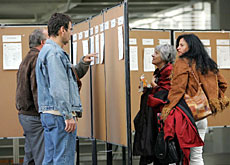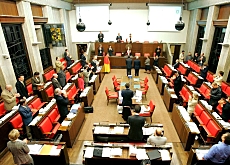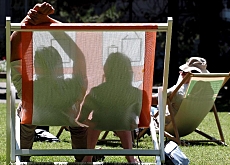Far-left parties get boot in Geneva elections

A new populist rightwing party has gained ground in the cantonal elections in Geneva at the expense of far-left parties, which lost their place in parliament.
But the vote was so tight that ballots are being recounted and Sunday’s results could be overturned.
The big winner was the rightwing Geneva Citizens’ Movement (GCM), which gained more than 7.7 per cent of the vote.
The party, which was created only three months ago by dissidents from the rightwing Swiss People’s Party, can expect to have nine seats in parliament.
Eric Stauffer, vice-president of the GCM, called the result “historic”, adding that his party would be aiming to attract more taxpayers to Geneva.
While it says that it is neither to the left or right of the politicial spectrum, most commentators place the party on the far right.
It made its presence felt during a recent federal vote by opposing the extension of a labour accord with the European Union to the ten new member countries.
Losing streak
The big loser of the weekend elections was the far left, which ran under two separate banners. The Leftwing Alliance was handicapped after some of its members defected to the SolidaritéS.
Neither party managed to reach the seven-per-cent quorum needed to enter parliament. The Alliance spent much of Sunday close to the quorum, but finally fell short with 6.9 per cent of the vote. The SolidaritéS were worse off with 6.68 per cent of votes.
Green Party parliamentarian Antonio Hodgers said it was regrettable that many people who had voted for the far left would have no one representing them in the assembly. A recount is underway, leaving the far left hoping for a reprieve.
No gains
The more traditional parties, apart from the Greens, failed to make progress. The centre-right Liberals, Radicals and Christian Democrats held on to their seats, giving them the largest voting block in parliament.
The Greens received 13.9 per cent of the vote, 2.7 points better than in the 2001 parliamentary elections.
They will now have 16 representatives in the assembly, five more than previously.
The rightwing People’s Party earned an extra seat, taking its total to 11, and consolidating its position in Geneva’s political make-up. The centre-left Social Democrats lost two seats to fall back to 17 seats.
The elections were held against a backdrop of political paralysis that set in four years ago when the left lost control of parliament as the People’s Party made a grand entry, winning ten seats.
Since then both the right and left have been locked in a political version of trench warfare, with progress blocked on a number of crucial issues, such as housing and unemployment.
swissinfo with agencies
Geneva statistics:
Population: 428,000.
Jobless rate: 7.1%.
Housing vacancy rate: 0.15%.
Average monthly earnings: SFr6,062 ($4,740).
Exports: SFr10.465 billion.
Imports : SFr7.772 billion.
On October 9, Geneva citizens were asked to renew their parliament for the next four years.
There were two surprises: the disappearance of the far left from the assembly, and the arrival of a new rightwing party.
The centre left (Greens and Social Democrats) will have 33 represntatives in the 100-seat parliament, while the centre right (Liberals, Radicals and Christian Democrats) will have 47 seats.
The remaining seats will go to the rightwing People’s Party and the Geneva Citizens Movement.

In compliance with the JTI standards
More: SWI swissinfo.ch certified by the Journalism Trust Initiative


You can find an overview of ongoing debates with our journalists here. Please join us!
If you want to start a conversation about a topic raised in this article or want to report factual errors, email us at english@swissinfo.ch.